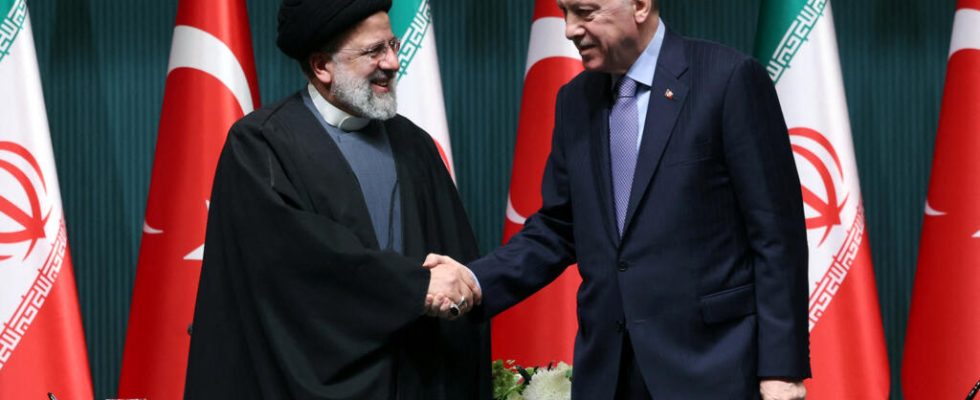Turkish President Recep Tayyip Erdogan received his Iranian counterpart Ebrahim Raïssi in Ankara this Wednesday, January 24, during a high-level Turkey-Iran Cooperation Council. Beyond bilateral relations, the two leaders mainly discussed the war in Gaza.
3 mins
During the press conference which followed the meeting of the two presidents in Ankara this Wednesday, Ebrahim Raïssi and Recep Tayyip Erdogan endeavored to put forward a common position against the Israeli offensive in Gazareports our correspondent in Istanbul, Anne Andlauer. The Turkish president affirmed that the two countries shared “ a determination to continue to cooperate to support the just Palestinian cause “. Ebrahim Raïssi, in the same way, stressed that Iran and Turkey were “ agree support the Palestinian resistance “. Ankara and Tehran therefore find themselves in total condemnation of Israel’s attacks against the Gaza Strip.
Differences over their relations with Israel
But without naming the other country, the two presidents also expressed criticisms or concerns which reveal their differences. Ebrahim Raïssi notably estimated that “ when countries that have political and economic relations with the Zionist regime break these relations, they will be effective in stopping the killings » in Gaza.
But Turkey, despite the war, continues to maintain close economic ties with Israel, and did not break off diplomatic relations either. A fervent defender of the Palestinian cause, President Erdogan has been one of the most virulent critics of Israel since the start of the war in Gaza. However, the Turkish head of state has so far considered it impossible to “ break up completely » with Israel, with which his country continues to trade.
Recep Tayyip Erdogan, for his part, underlined “ the importance of avoiding actions that could further threaten the security and stability of our region “. A way of calling on Iran not to extend the conflict in the region.
A ” tactical proximity » between the two countries
The two heads of state also affirmed their desire to fight against terrorist threats, three weeks after a double suicide attack claimed by the jihadist group Islamic State, which left more than 80 dead in southern Iran. The two leaders also demonstrated their desire to increase their bilateral trade, bringing it to 30 billion dollars.
According to experts, the war in Gaza has created a “ tactical proximity » between Tehran and Ankara, despite their complex, even dissonant, relations on geopolitical issues other than the conflict between Israel and Hamas. In the past, Turkey has notably supported rebel groups in Syria against President Bashar al-Assad, supported by Moscow and Tehran.
THE Ankara’s support for Azerbaijan over the disputed territory of Nagorno-Karabakh, which Baku seized in September 2023 in a lightning offensive, also irritated Iran. The country indeed takes a dim view of any ambition of Azerbaijan, an ally of Ankara, to carve out a corridor in Armenian territory. towards the Nakhichevan enclave, which runs along Iran’s northern border and which could complicate its own access to Armenia.
Read alsoConflict in Israel: risks of conflagration in the Middle East?
(And with AFP)
